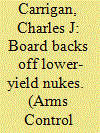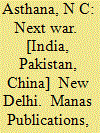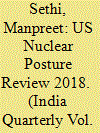| Srl | Item |
| 1 |
ID:
152192


|
|
|
| 2 |
ID:
171735


|
|
|
|
|
| Summary/Abstract |
Nearly six and a half decades after the above statement was made by Henry
Kissinger, it seems to be yesterday once more. Yet again, the nuclear world
seems to be standing on the threshold of being seduced by the utility of
counterforce capabilities. Nuclear deterrence by denial, or the projection of
an ability to fight a limited nuclear war, seems to be back in fashion. Such a
school of thought is known to have guided US nuclear strategy between the
1960s and the 1980s. But, the idea of being able to successfully fight and win
a nuclear war with another nuclear armed nation was pretty much abandoned
by the late 1980s. This transformation in thinking came about as a result of
many factors, but was facilitated, to a large extent, by the simultaneous
presence of leaders in the USA and USSR who thought more strategically
about nuclear issues
|
|
|
|
|
|
|
|
|
|
|
|
|
|
|
|
| 3 |
ID:
161291


|
|
|
|
|
| Publication |
New Delhi, Manas Publications, 2017.
|
| Description |
320p.hbk
|
| Standard Number |
9788170495253
|
|
|
|
|
|
|
|
|
|
|
|
Copies: C:1/I:0,R:0,Q:0
Circulation
| Accession# | Call# | Current Location | Status | Policy | Location |
| 059524 | 355.031095/AST 059524 | Main | On Shelf | General | |
|
|
|
|
| 4 |
ID:
160795


|
|
|
|
|
| Summary/Abstract |
The latest NPR released in 2018 under the watch of President Trump, unabashedly echoes the sentiment of America First. Many nuclear war-fighting issues and concepts that had been settled in the past after having been experimented with and discarded for the risks they carried have yet again been adopted by the current NPR. But, America’s sole focus on its own security alone could end up creating more security dilemmas for the US, and others. This article identifies the main highlights of the NPR, as well as its limitations, and the implications of both for nuclear strategies of major nuclear players. It describes and analyses the context, the content and the consequences of the NPR. It specifically flags some issues/actions that India must particularly watch out for since some of these need to be monitored for their implications on the nuclear strategies and trajectories of India’s nuclear armed neighbours.
|
|
|
|
|
|
|
|
|
|
|
|
|
|
|
|